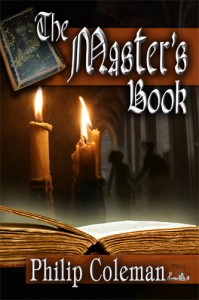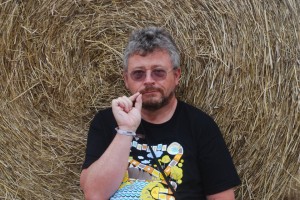I’m guest posting over at Meradeth Houston’s blog with tips and techniques for keeping continuity between books in a series; a topic close to my heart as I’m currently writing the second Elixir book, Elixir Saved.In my stead Muse author Philip Coleman, author of The Master’s Book, which comes out this Friday (check out my Goodreads review), is holding down the blog fort. (And I haven’t forgotten about making my big announcement about Elixir Bound. Stay tuned later this week for it, along with a giveaway!)
 What made you want to become a writer?
What made you want to become a writer?
I suppose it started in the beginning with reading. Even as a child I used to narrate to myself how I felt in certain situations, or imagine stories based on my favourite fictional characters. Then the cares of adulthood put it to the back of my mind for a long time until…well, you’ll see further on.
What inspired you to write The Master’s Book?
I had had a couple of attempts at writing fantasy with only partial success and decided I wanted to try writing a contemporary young adult novel with a real setting for a change. Brussels was the obvious choice for me, despite its reputation for boring EU bureaucracy. I lived there for three years when my children were around the ages of Sean and Maeve in my story. This isn’t to say that Sean and Maeve are modeled on my children; simply that being in Brussels with my son and daughter gave me a glimpse of the city through their eyes. It was a very rich and formative time in their lives, when they were exposed to a lot of new experiences. Among these was the experience of interacting with (stunningly beautiful) children of racially mixed marriages in their school. This was the inspiration for Stephanie, the other main character in the book. And, finally, Brussels and its hinterland are such a rich mix of the modern, the medieval and just about every era in between. This factor became the other big piece in the jigsaw of ideas.
What one book do you wish you had written?
Definitely Philip Pulman’s His Dark Materials trilogy. Not that it’s my favourite book (I have lots of favourites). It’s just that it’s such a rich story, with so many moments of action, horror and high emotion, all held together by one of the most wonderful characters ever created in children’s literature. In fact, the last chapter, which takes place in the Oxford Botanic Garden, inspired my first attempt at writing a novel: a fantasy set in an imaginary botanic garden. Maybe I will return to that idea some day, now that I know much more about the craft of writing!
At what moment did you truly begin to feel like an author?
I suppose it was when my second attempt at a novel got to a second reading with Usborne (and then with Chicken House). It didn’t get any further (and probably shouldn’t have) but it encouraged me to keep going.
What is your favorite part of the writing process? What is your least favorite part?
Some scenes just spring from the page with very little effort and this is always exciting. You know what the characters are going to say and you can imagine all the little gestures that bring the scene to life. Such a scene in my story was the one in the Museum of Musical Instruments. This is when writing is most rewarding. As for the least favourite part of the process, that’s probably when you’re trying to bridge from one pivotal scene to the next without losing the pace of the story; that’s really hard work. And then, of course, there’s proofreading, at which I am so bad.
What is the single best piece of advice you have for aspiring authors?
Can I have two? They would be: (1) don’t be shy about you’re writing – put it out there for praise and criticism; and (2) don’t give up on any account.
What is next for you in your writing career?
I started a sci-fi novel before I got the contract from MuseItUp for The Master’s Book and I would like to come back to that at some stage. However, right now I am working on a sequel to The Master’s Book. Not that I’ve been asked to or anything; it’s just that I had an idea for a sequel that would centre around Belgium’s connection with the Rwandan genocide.
What is something funny/weird/exceptional about yourself that you don’t normally share with others in an interview?
Oh gosh! Isn’t writing fiction crazy enough? Well, I was asked something similar at a workshop I attended a few weeks ago and the best I could come up with was that I was involved in the location hunt for Saving Private Ryan (which is true – that very violent opening scene was, in fact, filmed in Ireland and not in Normandy).
And here’s the fun part…below are three list of words from the magnetic refrigerator poetry set…if you so choose, please write up a little piece of poetry or prose from these words. You can also do this from the perspective of one of your characters!
That’s a great idea for a workshop exercise! Tricky! In the end, I chose to write this as an episode in my story.
I reached out for my phone. The screensaver read 3.16 a.m. I rubbed my eyes and tried to get back to sleep but I couldn’t.
Sean, what’s nagging you?
Then I remembered. Yesterday I’d asked Stephanie to a movie and she’d said “Yes”…
And then what? How should I behave? Will she let me kiss her?
My mouth felt dry, with a bitter taste. I needed a drink. I pushed off the duvet, put my feet into my slippers and headed down to the kitchen, where I flicked on the light and went to open the fridge.
Those word magnets were there, the ones Dad was always messing with. Sometimes I liked playing games with them myself. When no-one was around I’d make up cheeky sentences with them and then play dumb afterwards when Mam asked who’d done it.
The magnet with the word “girl” had been placed a little separate from the rest. Was that Dad’s idea of a joke? Or Maeve’s? Whoever hed done it, they made me think of Stephanie again.
I placed it even further apart from the others. I ran my finger down the vertical lines of the other word magnets. Stopping at the word “beautiful”, I put that beside “girl”. Then I saw the word “hot”. Maybe that was a better description, even though I blushed at the thought. Still, I put it to one side as well.
I picked out more magnets: “black” (of course), “strong”, “funny”, “precious”, “sweet”…
My finger paused at “gentle”. No way! What about “angel”? Certainly no way!
Somebody had put “love” and “sex” side by side – maybe Dad again? I hesitated over them, blushing even more. I couldn’t screw myself up to put them beside the others.
I pushed all the magnets I’d separated out into a tight cluster and stared at them for few seconds. Then, just as I went to open the fridge I saw the magnet with the word “cliché”, buried in a long row of others. I blushed yet again.
What are you doing Sean? What do you think Dad’ll say if he sees what you’ve done? Get a grip.
Hastily, I jumbled all the word magnets into one big messy cluster, then opened the fridge, seized a water bottle and went upstairs.
The Master’s Book blurb:
In 1482 Mary, the last Duchess of Burgundy, lies on her deathbed in a castle in Flanders. She is only 24. In her final moments she makes a wish that, 500 years later, will threaten the lives of a boy and a girl living in Brussels.
The Master’s Book is the story of Sean, an Irish teenager, just arrived in Brussels to a house that is also a crime scene. Together with Stephanie, his classmate, he finds an illuminated manuscript, only for it to be stolen almost at once.
Where did this manuscript come from? Who was it originally made for? Is there a connection with the beautiful tomb Sean has seen in Bruges? Above all, why does someone want this book so badly that they are prepared to kill for it?
Part thriller and part paper-chase, this book is aimed at boys and girls of twelve and over. The Master’s Book is available for pre-order at the MuseItUp bookstore.
Philip Coleman has worked as a biologist for most of his life—in Ireland, Belgium and now in Switzerland. Having been an avid reader all his life, he took up writing only in 2006. This is his first published novel. He drew his inspiration for the story from the period he spent working for the EU in Brussels. He has a grown-up son and daughter (who were roughly the same ages as Sean and Maeve during the time in Brussels but otherwise aren’t a bit like them at all!). He now lives in France.




















